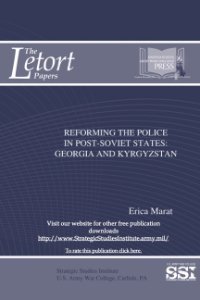Reforming the Police in Post-Soviet States: Georgia and Kyrgyzstan
By Erica Marat
In most Soviet successor states, the police militia are among the least trusted government agencies. The police are frequently seen as representatives of the state who are allowed to persecute ordinary citizens, extort bribes, and protect the real criminals. This leads to cycles of mutual antagonism in which society does not expect the police to perform their function properly, and the police are unable to enforce state regulation of society. In the examples of Georgia and Kyrgyzstan in this monograph, Dr. Erica Marat examines which domestic processes will likely fail and which have a chance to succeed in changing the post- Soviet police from a punitive institution into a more democratic entity. Dr. Marat demonstrates that the fundamental element of police reform in the post-Soviet context must be a redefinition of what constitutes the legitimate use of violence against civilians to maintain order in everyday life and during mass protests. It means toning down the use of forceful methods against the unruly and redefining which crimes must be prosecuted. In the course of the reform, the government must relinquish its ability to control the thoughts and actions of opponents and the people. Instead of being used as a punitive instrument of oppression, the postauthoritarian police must learn to behave in a transparent, accountable way, by respecting the rights of citizens. Importantly, new venues and forms of interaction between society and the police should emerge, while a country's chief police agency should become responsive to the concerns of the public. The police must begin to work on behalf of the public, not the regime, and to obey the rule of law, not government orders. Essentially, democratic police reform in the post-Soviet or any context means entrusting the citizenry to police the police
Carlisle, PA: U.S. Army War College,Strategic Studies Institute, 2013. 74p.


